

Writing job applications. Employers may receive hundreds of applications for a job, so it's vital to make sure that the letter or e-mail you send with your CV/résumé creates the right impression.
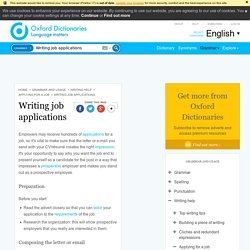
It's your opportunity to say why you want the job and to present yourself as a candidate for the post in a way that impresses a prospective employer and makes you stand out as a prospective employee. Preparation Before you start: Read the advert closely so that you can tailor your application to the requirements of the jobResearch the organization: this will show prospective employers that you really are interested in them. Composing the letter or email General points: Keep it brief. Structure The usual order of a job application letter or email is: The position applied for: give the title of the job as a heading, or refer to it in the first sentence of your letter, using the reference code if there is one. Sample job applications.
Writing a CV/résumé. Before beginning to draft your CV/résumé, read the advert carefully so that you are clear about the specific requirements of the job you’re applying for.
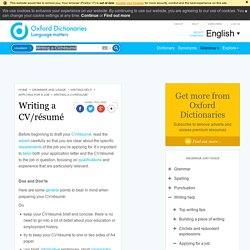
It’s important to tailor both your application letter and the CV/résumé to the job in question, focusing on qualifications and experience that are particularly relevant. Dos and Don’ts Here are some general points to bear in mind when preparing your CV/résumé: Do Don’t go into too much detail: employers are too busy to read rambling or unfocused CVs/résumés.leave gaps in your employment history: add a sentence or two explaining any periods that are not accounted for.use too many different fonts or typefaces: keep to one or two that are clear and easy to read.use inappropriate colours, graphics, or photos.name people as referees unless you’ve confirmed that they’re happy to provide a reference for you.
Structuring your CV/résumé Personal details Always begin with your personal details, i.e. Advice on writing CVs. Interviewer: LearnEnglish Professionals is talking to John Woodrow, who works in the Human Resources department of a large UK-based company.
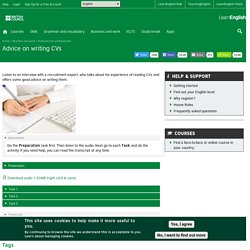
John, tell us about your work ... John Woodrow: I work on recruitment, especially – so I’m the person who reads the hundreds of CVs we get sent each year! Interviewer: Do you accept CVs as part of your recruitment process? John Woodrow: When we advertise for a particular post, we send out our own application form, which is tailored to our company, and we can use it to make sure we find exactly what we’re looking for ... Interview questions with answers. Here you will find tips on how to answer over 150 common interview questions such as What are your strengths?
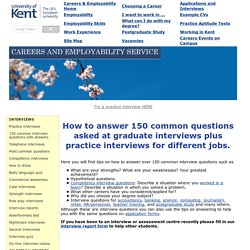
What are your weaknesses? Your greatest achievement? Hypothetical questions. Competency interview questions: Describe a situation where you worked in a team? Although these are interview questions you can also use the tips on answering to help you with the same questions on application forms. If you have been to an interview or assessment centre recently please fill in our interview report form to help other students. Also see our interview skills pages. Find Jobs: Search thousands of jobs now. Achievements. What is Achievement?
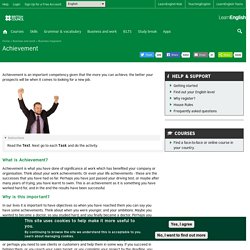
Achievement is what you have done of significance at work which has benefited your company or organisation. Think about your work achievements. Or even your life achievements - these are the successes that you have had so far. Perhaps you have just passed your driving test, or maybe after many years of trying, you have learnt to swim. This is an achievement as it is something you have worked hard for, and in the end the results have been successful. 10 Most Common Interview Questions. At the University of Kent we asked students what questions they were asked at graduate selection interviews by a variety of employers and for a range of jobs.
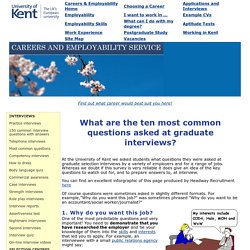
Whereas we doubt if this survey is very reliable it does give an idea of the key questions to watch out for, and to prepare answers to, at interview. You can find an excellent inforgraphic of this page produced by Headway Recruitment here Of course questions were sometimes asked in slightly different formats. For example,"Why do you want this job? " was sometimes phrased "Why do you want to be an accountant/social worker/journalist? " 1. One of the most predictable questions and very important! "I'm always ready to take on responsibility and feel this will come more quickly with a firm of this size. Try to find some specific feature on which the employer prides themselves: their training, their client base, their individuality, their public image, etc.
See our Commercial Awareness page for more help with this 2. 3. 4. 5. 6. 7. 8. 9.